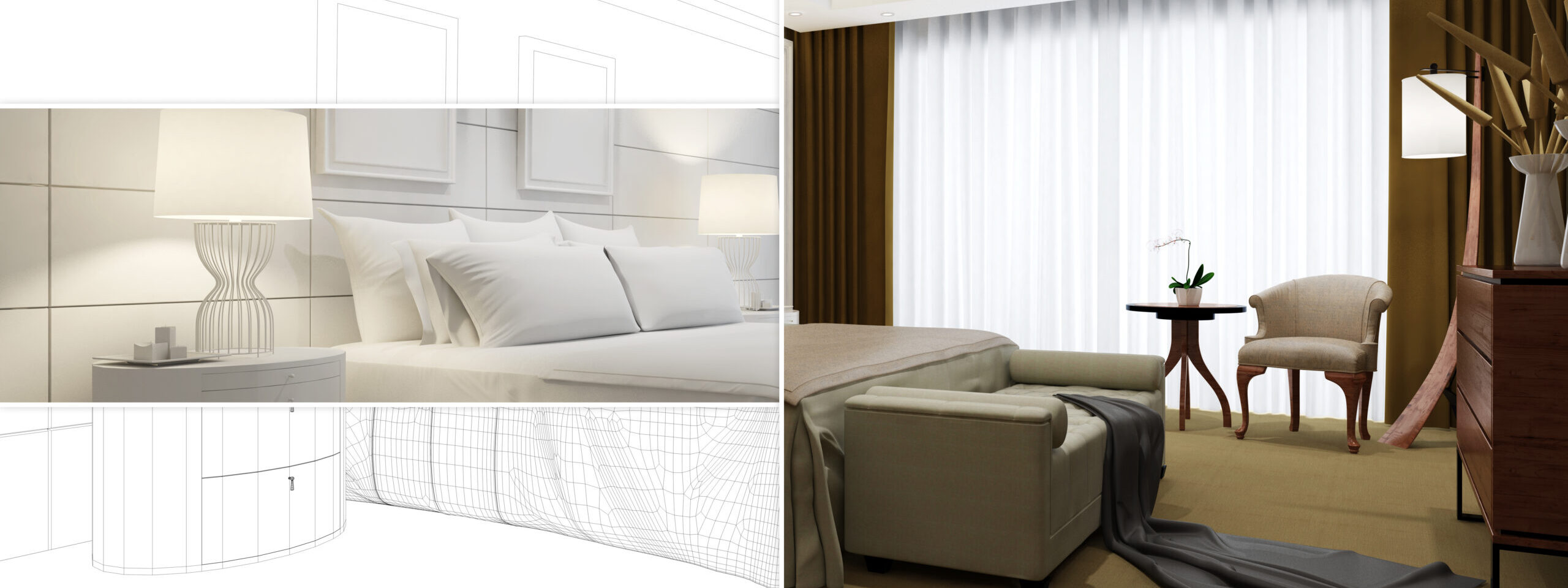
We have all seen the articles: how will travel be different, what could the future of hospitality design be, how will staying in a hotel be affected by COVID-19? We have seen the change and speculations about mobile check-ins, stricter deep cleaning guidelines, and more hands-free situations.
But what about purchasing? How will FF&E procurement be different due to the changing standards and regulations from the effects of COVID-19? Well the short answer is that it won’t really.
Our collaborative approach is mostly virtual by nature, due to the locations of each team involved. While our normal ways of doing business don’t need to adjust very much at all, there are a few ways it might look a bit different from the industry side and how it is approached.
Purchasing FF&E Before, During, and After a Pandemic
Remote Project Teams
We mentioned the virtual nature of our business, and that has been key to maintain service operations during this time. While we operate from our office locations (or from home offices more recently) and usually only have a handful of site visits at most, our teams are ever connected and communicating throughout the entire process. In a sense, we have been operating remotely for over 41 years, as far as maintaining that collaboration with the clients, designers, and vendors. This has allowed us to maintain our effectiveness and continue the virtual conferences and meetings that were already happening prior.
Integrated Work Brings Knowledge of Requirements
Because we are so deeply connected to each stage of the process, our teams bring an expertise of the industry, operations, and standards that run through each stage of the entire process. If there is a new requirement, we can help ensure it gets implemented. If a designer has a new way of doing things due to new safety codes, we stay updated and informed. That connection hasn’t changed and won’t be affected.
Vast Network Allows for Availability
In addition to knowledge that relates to operations, we have been able to build a vast network of suppliers and manufacturers over the years. This gives us a great advantage of options. With new standards and requirements in place for safety and cleanliness, having a large network will help to ensure that there will always be a way to meet the necessary lead times while staying within the guidelines of new safety protocol.
Remote Management
Our teams have coordinated freight management, warehouse and inventory management, and installation management remotely for years, and has continued to meet those requirements during a time when everything had to be remote.
So for the most part, FF&E procurement has stayed strong, consistent, and unaltered, at least from the point of view of a purchasing agent.
How the Hotel Industry Might Approach Procurement Differently
Much like hotel and travel procedures, there are new regulations on factories to ensure the highest safety and cleanliness protocols. In addition, while the focus hasn’t been on tariffs recently for obvious reasons, it is still something that is happening and needs to be monitored. As countries start to reopen their trade borders more, there are likely going to be more restrictions and regulations involved with that as well.
Those factors are just a few things that will make sourcing a bit more difficult in general. Self-sourcing and small in-house purchasing teams has been a growing trend in the last few years, but the complexities of the situation make them much more challenging. It has never been more important to have a large sourcing network for further availability of suppliers. The kind of network that in-house teams are just not able to create and maintain easily.
We’ve reviewed in the past the benefits of outsourcing work to professional consultants, especially when revenue streams are low. It’s as true before as it is now, if not even more so. When considering value, and making things stretch, out sourcing work to a consulting firm like a purchasing company saves time, money, and provides a vast pool of knowledge and resources. Plus, it’s a fixed cost with no overhead.
For these reasons, there is going to be a decrease in companies expanding their services to also include procurement. In fact, we’ve already seen several in-house departments transitioned to more contract and outsourcing work.
Taking Extra Safety Precautions Regarding FF&E Purchasing
If our services and operation model is remote by nature, what would we have to change at all? How is FF&E and OS&E procurement going to look different in the future? Well, for one thing there are only a handful of “touchpoints” when it comes to purchasing.
When we receive samples and items in the mail, we take the utmost caution and are adding additional safety measures to ensure that they stay clean when we send them out for approval. While the time for certain long-distance freight is enough to help ensure the safety of the product, domestic mail is much faster. So we are fully aware and conscious of new handling procedures to keep our teams and clients safe.
In addition, any on-site installation review has the capability to be carried out remotely via a video chat. Virtual walkthroughs may not be necessary in all situations, but it is an option and available when and if needed.
Hospitality is Strong
All in all, the process of FF&E purchasing may have to adjust to adapt to changing circumstances, but for the most part will remain the same. While the entire hospitality industry is learning how to adjust, so is the traveler. But one thing will always remain: there will always be a traveler. The desire to learn, to grow, to see new places, to connect with family and friends, or just to relax will ALWAYS be in each person who travels, and we will be there to greet them when they do. The hospitality industry has seen many things and has been through many ups and downs, and will come back once again. #hospitalitystrong





